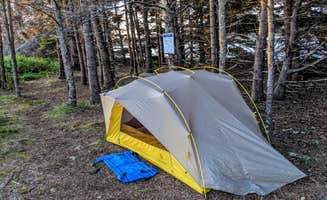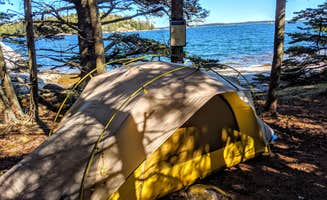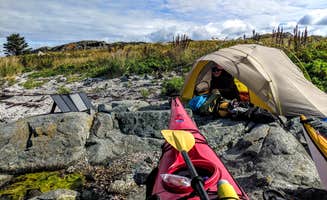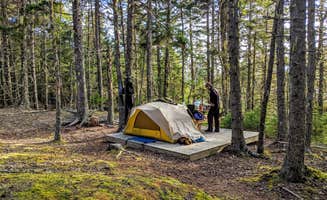The Deer Isle Archipelago offers primitive boat-in camping opportunities across several islands in the Gulf of Maine. These dispersed campsites require watercraft access, typically sea kayaks or small boats, and provide minimal amenities. Weather in this region can shift rapidly, with morning fog common in summer and water temperatures remaining cold year-round, requiring additional safety considerations for campers planning multi-day island excursions.
What to do
Island exploration: Marshall Island features a 10-mile trail system that circles the perimeter and crosses the interior. According to a camper at Marshall Island, "Sand Cove is perfect for a beach fire and stargazing on a clear night– some of the best stargazing spots we've ever seen!"
Wildlife observation: The archipelago hosts numerous seabird colonies and marine mammals. Visitors to Wheat Island report "gorgeous views of the Gulf" with opportunities to observe wildlife during sunrise and sunset.
Day trips to Acadia: Several islands serve as strategic bases for accessing remote sections of Acadia National Park. Wheat Island provides "perfect island for exploring the close-by Isle au Haut, a remote section of Acadia National Park," according to reviewers.
What campers like
Secluded beaches: The sandy shores on certain islands provide rare beach access in Maine's typically rocky coastline. A visitor to Buckle Island noted it has "a sandy shore, which is exposed for a good portion of the day, is easy to land on and a short walk to a trail into the woods."
Night skies: The distance from mainland light pollution creates exceptional stargazing conditions. One camper described Marshall Island as having "some of the best stargazing spots we've ever seen!"
Strategic paddling route points: These islands function as waypoints for multi-day kayak journeys. A reviewer described Doliver Island as "a good stop for us on our 9 day journey and a perfect launching spot for crossing Jericho Bay (4.5 miles) to Marshall Island the next day."
What you should know
Landing conditions: Tidal changes significantly impact access points. One visitor warned about Doliver Island: "This can be a tricky island to land on at high tide, so plan accordingly."
Seasonal insect populations: Mosquitoes persist late into the season. A Wheat Island camper noted: "We thought we were passed mosquito season in early September, but alas, they were pretty bad at sunset."
Variable fire regulations: Policies differ by island. While fires are allowed on Marshall Island, Buckle Island, and Wheat Island, they are prohibited on Doliver Island and some other MITA locations.
MITA membership requirement: This free camping near Thomaston, Maine requires Maine Island Trail Association membership for legitimate access. Membership includes a detailed guide with navigation information and specific landing instructions for each site.
Tips for camping with families
Best beginner-friendly island: Consider Buckle Island for first-time sea kayak camping with children. A reviewer called it "a perfect island for those new to sea kayak camping as the sandy shore, which is exposed for a good portion of the day, is easy to land on."
Tent capacity planning: Site sizes vary dramatically between islands. Doliver Island can barely fit "just 1 tent" while other locations like Marshall Island offer more spacious options with tent platforms.
Water requirements: Calculate 1-2 gallons per person per day as no fresh water exists on the islands. Careful planning is essential as one visitor notes you must "come prepared with fresh water (there is no fresh water for filtering)."
Emergency resupply options: For longer trips, know where to restock supplies. A Marshall Island camper mentioned "If you happen to need a food or water resupply, Swan's Island is a short paddle away and has a very small grocery store and town office with fresh water."
Tips from RVers
Mainland parking security: When leaving vehicles for multi-day boat trips, use designated long-term parking areas. The free dispersed camping opportunities near Thomaston require secure vehicle storage during your island stay.
Gear transport logistics: Specialized kayak carts or portable dolly systems help with launching from parking areas. Pack essential camping gear in waterproof containers that fit securely in kayak hatches or small watercraft.





